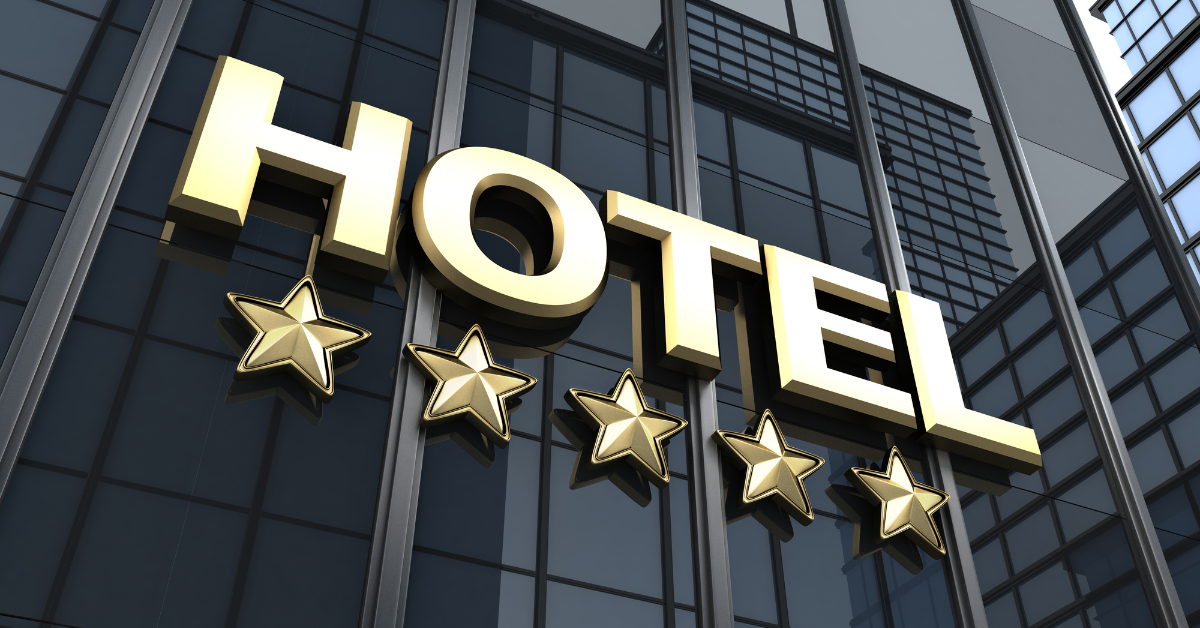The purpose of this guide, “Hotel SEO Made Simple: A Step-by-Step Guide for General Managers and Marketers”, is to provide a comprehensive guide for hotel owners, general managers, and marketers on how to optimise their hotel’s online presence through Search Engine Optimisation (SEO) techniques.
Hotel SEO is a crucial aspect of digital marketing that helps hospitality businesses rank higher on search engine results pages (SERPs) and attract more traffic to their websites which can help online visibility, attract more bookings, and ultimately increase revenue.
This guide is specifically tailored to hotel owners, general managers, and marketers who may not have extensive knowledge or experience in SEO but want to improve their hotel’s online presence in order to drive more direct bookings thereby reducing their reliance on online travel agents (OTA’s) and improving margins.
It provides a step-by-step guide that covers everything from keyword research and on-page optimisation to link building and local SEO strategies including:
- The importance of SEO for hotels
- Keyword research
- On-page optimisation
- Off-page optimisation
- Local SEO
- Technical SEO
- Analytics and Reporting
- Additional resources
By following the strategies outlined in this guide, hotel owners, general managers, and marketers will be able to:
- Improve their hotel’s online visibility and attract more traffic to their website
- Increase direct bookings and reduce reliance on online travel agencies (OTAs)
- Build a strong online reputation and improve customer trust and loyalty
- Stay ahead of the competition and maintain a competitive edge in the market
Overall, “Hotel SEO Made Simple” is a must-read for any hotel owner, general manager, or marketer who wants to take their hospitality marketing to the next level and drive more revenue through direct bookings.
Who is it for?
The world of digital marketing can be overwhelming, and it can be challenging to determine who can benefit from Hotel SEO strategies.
By optimising website content, metadata, and images with relevant keywords, hotels can rank higher on search engine results pages (SERPs). This, in turn, increases the likelihood of potential guests finding and booking their property.
Moreover, with the rise of mobile devices, optimising for local search has become more critical than ever.
When potential guests or travellers search for hotels on their mobile devices, search engines prioritise results based on geographic location.
By implementing local SEO techniques, such as claiming and optimising Google Business Profile (GBP) listings, hotels can increase their chances of showing up in local search results.
Additionally, SEO can help hotels establish themselves as thought leaders in their respective niches.
By creating high-quality, informative content that addresses common traveller questions and concerns, hotels can position themselves as experts in their field.
This can lead to increased brand recognition, customer loyalty, and positive online reviews.
In conclusion, hotel SEO is crucial for hotel owners, general managers, and marketers who want to increase their online visibility, drive traffic to their websites, and establish themselves as thought leaders in the hospitality industry.

The Importance of Hotel SEO
Having a strong online presence is vital for any business, and hotels are no exception.
For hotels, SEO is an essential tool to attract potential guests, increase online visibility, and ultimately drive revenue.
First and foremost, SEO allows hotels to reach their target audience.
By optimising their website with relevant keywords, hotels can increase their chances of appearing in search engine results when potential guests search for specific terms related to their property, location, or amenities.
This means that hotels can attract more qualified traffic to their website, which can result in more bookings and revenue.
Furthermore, hotel SEO can help build credibility and trust with potential guests.
When a hotel appears at the top of search engine results pages for specific geographic location searches, or hotel ‘styles’ (e.g. modern, rustic, boutique, luxury etc), it signals to potential guests that it is a reputable and reliable property.
This can be especially important for independent hotels that may not have the same brand recognition as larger hotel chains.
Moreover, SEO is a cost-effective marketing strategy that can deliver long-term results.
While other marketing tactics such as paid search or social media advertising require ongoing investment, SEO can generate organic traffic to a hotel’s website for months or even years after the initial optimisation.
This means that hotels can continue to reap the benefits of their SEO efforts long after they’ve implemented them.
In conclusion, hotel Hotel SEO is a critical component of any hotel’s marketing strategy. By optimising their website for search engines, hotels can attract more qualified traffic, build credibility and trust with potential guests, and generate long-term revenue.
Understanding SEO
What is Hotel SEO?
With so many hotels competing for online visibility, it’s critical to ensure that your website is optimised for search engines.
There are several factors that influence your website’s SEO, including:
1. Keyword Research: Identifying the keywords that your customers are using to search for hotels in your area is the first step in optimising your website for search engines.
2. On-Page Optimisation: This refers to optimising your website’s content, including titles, headings, meta descriptions, and alt tags.
3. Site Structure: A well-organised website structure can improve your website’s SEO by making it easier for search engines to crawl and index your pages.
4. Link Building: Building high-quality backlinks from reputable websites can improve your website’s authority and help it rank higher in SERPs.
5. Local SEO: Optimising your website for local search is essential for hotels as most customers search for hotels in specific locations.
SEO is an ongoing process that requires continuous monitoring and optimisation to ensure that your website remains visible to your target audience.

How search engines work
Search engines like Google and Bing are the backbone of the internet.
They are the gatekeepers that help users find the information they are looking for.
As a hotel owner, general manager or marketer, it is crucial to understand how search engines work, as they can make a significant impact on the online visibility of your hotel.
Search engines use complex algorithms to crawl through millions of web pages and index them in their databases.
When a user types a query into the search bar, the search engine retrieves the most relevant pages from its database and displays them in the search results.
The search engine’s primary goal is to provide the most relevant and trustworthy information to its users.
It achieves this by considering various factors when ranking web pages. The factors may include the quality of the content, the relevance of the keywords, the number of backlinks, and the user experience.
One essential factor that search engines consider is content quality.
The content should be informative, engaging and helpful to the users. It should also be optimised with relevant keywords that match the user’s search intent.
The keywords should be placed strategically within the content without stuffing them unnecessarily.
Backlinks are another critical factor that search engines consider when ranking web pages.
Backlinks are links from other websites that point to your hotel’s website.
The more high-quality backlinks your hotel’s website has, the higher it will rank in the search results. However, it is essential to note that not all backlinks are equal. The quality of the backlinks matters more than the quantity.
User experience is also a crucial factor that search engines consider. If the user finds your website difficult to navigate, slow to load, or filled with irrelevant ads, they are likely to leave quickly.
This behaviour will signal to the search engine that your website is not providing a good user experience, which will negatively impact your ranking.
The importance of keywords and phrases
The importance of keywords and phrases cannot be overstated in the world of hotel SEO.
Keywords and phrases are the foundation upon which search engines base their search results.
Without the right keywords and phrases, your hotel website is unlikely to rank well in search engine results pages (SERPs), meaning your target audience is unlikely to find you.
Keywords and phrases are the words and phrases that people type into search engines when they are looking for information.
When you optimise your website for keywords and phrases, you are telling search engines that your website is relevant to those search terms.
As a result, search engines are more likely to serve your website to people who are searching for those terms.
The first step in optimising your hotel website for keywords and phrases is to identify the keywords and phrases that people are searching for.
You can use tools like Google’s Keyword Planner or SEMrush to research the most popular keywords and phrases in your niche.
Once you have identified your target keywords and phrases, you should ensure that they are included in your website’s meta tags, headings, and content.
However, it is important to note that keyword stuffing (the overuse of a keyword in an attempt to manipulate search engine rankings) is not an effective hotel SEO strategy.
In fact, it can harm your website’s ranking and credibility. Instead, focus on creating high-quality content that provides value to your target audience and naturally includes your target keywords and phrases.
In addition to including keywords and phrases in your website’s content, it is important to incorporate them into your off-page hotel SEO efforts.
This includes building backlinks from other reputable websites that use your target keywords and phrases in their anchor text.

Keyword Research
Identifying target keywords
Identifying target keywords is the first and most crucial step in any SEO strategy.
Keywords are the foundation of all hotel SEO activities, and selecting the right keywords can make or break your hotel’s online visibility.
In this section, we will discuss the process of identifying target keywords for your hotel website.
To identify your target keywords, start by brainstorming a list of words and phrases that describe your hotel’s services and amenities.
Think about what your guests might be searching for when looking for a hotel like yours.
For example, if your hotel is located in a popular tourist destination, some of your target keywords might include “hotels in [your city],” “luxury hotels,” “boutique hotels,” “beachfront hotels,” and so on.
Once you have a list of potential target keywords, it’s time to do some research.
Use keyword research tools like Google Keyword Planner, SEMrush, or Ahrefs to find out how many people are searching for each keyword and how competitive they are.
The goal is to find keywords that have high search volume and low competition.
When selecting your target keywords, it’s important to keep in mind the intent of the searcher. Are they looking for information about your hotel, or are they ready to make a reservation?
Understanding the intent behind the search will help you choose the right keywords and optimise your website accordingly.
1. Google Keyword Planner: This is a free tool that allows you to find relevant keywords and their search volume. You can use it to generate ideas for your hotel’s website content, including blog posts, landing pages, and product descriptions.
2. SEMrush: This is a paid tool that offers a comprehensive keyword research feature. It provides you with detailed insights into your competitors’ keywords, search volume, and traffic. SEMrush can help you to identify high-value keywords and optimise your hotel’s content for search engines.
3. Ahrefs: This is another paid tool that offers a robust keyword research feature. It allows you to analyse your competitors’ keywords, backlinks, and traffic. Ahrefs can help you to identify the most valuable keywords for your hotel and create content that resonates with your target audience.
4. Mos Keyword Explorer: This is a paid tool that provides you with accurate keyword data, including search volume, difficulty, and opportunity. Mos Keyword Explorer can help you to identify low-competition keywords that can drive traffic to your hotel’s website.
5. Keyword Tool: This is a free tool that generates long-tail keywords based on Google Autocomplete. It can help you to find relevant keywords that your target audience is likely to use when searching for hotels online.
Analysing keyword competition
Keyword competition refers to the number of websites that are trying to rank for the same keyword or phrase as you. The higher the competition, the more difficult it will be to rank for that keyword.
Another way to analyse keyword competition is to manually search for your targeted keywords and see what other websites are ranking for them.
Look at the top 10 search results and see what content they are offering.
Are they using the targeted keyword in their title tags, meta descriptions, and content? How many backlinks do they have? These factors can give you an idea of how difficult it will be to rank for that keyword.
It’s important to note that keyword competition can vary depending on the location and language you are targeting. For example, a keyword that is highly competitive in one region may be easier to rank for in another region.
Once you have analysed the competition for your targeted keywords, you can use this information to develop a strategy for your hotel’s SEO.
If you find that a keyword is too competitive, you may want to focus on related keywords that have lower competition.
You can also try to differentiate your hotel’s content by offering unique value that other websites are not providing.
On-Page Optimisation
Title tags and meta descriptions
These two elements appear in the search engine results pages (SERPs) and impact the click-through rate (CTR) of your website.
Title tags and meta descriptions provide a summary of the content on your page and help search engines understand the relevance of your website to a user’s search query.
Title tags appear at the top of the browser window and in the SERPs. They should be concise, and descriptive, and include your target keyword.
A good title tag should entice users to click on your website and provide a clear idea of what they can expect to find on your page.
For hotels, it’s essential to include the hotel name, location, and the keyword that best represents the page’s content. For example, “Luxury Hotel in Sydney – Book Your Stay Today!” is a good title tag that includes the hotel name, location, and a call-to-action (CTA) that encourages users to guide a room.
Meta descriptions appear below the title tag in the SERPs and provide a brief summary of the content on the page.
They should be no longer than 155 characters and include the target keyword. A good meta description should also include a CTA that entices users to click on your website.
For hotels, it’s essential to include information about the hotel’s amenities, location, and unique selling points.
For example, “Experience 5-Star Luxury at Our Sydney Beach Hotel – Book Your Stay Today and Enjoy Our Rooftop Pool, Ocean Views, and More!” is a good meta description that includes the hotel’s unique selling points and a CTA that encourages users to guide a room.

Header tags
Header tags are an important part of optimising your hotel’s website for search engines.
They act as signposts for search engines, indicating the main topics of your pages and helping to organise your content. Proper use of header tags can improve your website’s visibility in search results, making it easier for potential guests to find you.
There are six levels of header tags, ranging from H1 to H6. H1 tags are the most important and should be used for the main heading of each page.
This heading should be concise and descriptive, providing a clear indication of what the page is about. Avoid using generic headings like “Welcome” or “About Us.” Instead, focus on specific keywords related to your hotel’s location, amenities, or unique selling points.
H2 tags should be used for subheadings within the main content of your page. These headings should also be descriptive and relevant to the content that follows. H3 tags can be used for further subheadings within the H2 sections, and so on.
It’s important to use header tags in a logical and hierarchical order. This helps search engines understand the structure and content of your pages, making it easier to index and rank them. Avoid using multiple H1 tags on the same page, as this can confuse search engines and dilute the importance of your main headings.
In addition to helping with hotel SEO, header tags also improve the readability of your website. They break up large blocks of text and make it easier for users to scan and find the information they’re looking for. This can lead to longer time on site and lower bounce rates, both of which are positive signals to search engines.
Image optimisation
To optimise images for hotel SEO, the first step is to ensure that your images are of high quality and relevant to the hotel’s content.
The images should be clear and visually appealing and should complement the website’s design and layout.
The next step is to compress the images to reduce their file size without compromising their quality.
This can be done using various online tools or image editing software.
Compressed images load faster, which can improve the website’s loading speed and user experience.
Another important aspect of image optimisation is to include descriptive and relevant alt text and file names for the images.
Alt text is a short description of the image that appears when the image cannot be displayed, such as for users with visual impairments or slow internet connections.
Alt text helps search engines understand the context of the image and can improve the website’s SEO ranking.
In addition to alt text, it is also important to optimise the file names of the images.
File names should be descriptive and include relevant keywords, which can help search engines understand the content of the image and improve the website’s visibility in search results.
Finally, it is important to ensure that the images are properly formatted and optimised for different devices and screen sizes.
This can involve using responsive design techniques to ensure that the images adapt to different screen sizes and orientations and using appropriate image formats such as JPEG or PNG to ensure compatibility with different devices and browsers.
Internal linking
Internal linking is an effective way to boost the visibility and ranking of your website on search engines.
Internal links are links that connect pages within your website. These links help search engines understand the structure of your website, and they also help users navigate through your content.
Internal links can improve your website’s SEO by distributing the link equity of the pages on your website.
This means that the more links a page has pointing to it, the more valuable it is to search engines. By linking to other pages within your website, you can pass on some of this value to those pages and help them rank higher in search results.
One of the most important aspects of internal linking is choosing the right anchor text. Anchor text is the clickable text in a hyperlink.
It is essential to use relevant and descriptive anchor text that accurately reflects the content of the page you are linking to.
This helps search engines understand the context of the linked page and improve its visibility on search results.
Another important aspect of internal linking is the structure of your website.
It is crucial to create a clear and logical structure for your website that is easy to navigate for both search engines and users.
The structure of your website should be organised into categories and subcategories, with each page linking to relevant pages within the same category or subcategory.
In addition to improving your website’s SEO, internal linking can also improve the user experience of your website.
By linking to relevant pages within your website, you can help users find the information they are looking for quickly and easily. This can improve the user engagement and retention of your website.
Off-Page Optimisation
Link building
Link building refers to the process of acquiring hyperlinks from other websites to your hotel’s website.
The more high-quality links you have, the more authority your website will have in the eyes of search engines like Google.
There are several ways to build links for your hotel’s website.
One effective method is to create high-quality content that other websites will want to link to.
This could include blog posts, infographics, or videos that provide valuable information to potential guests.
When other websites link to your content, it signals to search engines that your website is a trusted source of information.
Another way to build links is through guest blogging. This involves writing articles for other websites in your industry and including a link back to your hotel’s website in your author bio.
This not only helps to build links but also helps to establish your hotel as an authority in your niche.
Social media can also be a powerful tool for link-building.
By sharing your hotel’s content on social media platforms, you increase the likelihood that other websites will discover it and link back to it.
It’s important to note that not all links are created equal. Links from high-authority websites are more valuable than links from low-quality websites.
It’s also important to avoid tactics like buying links or participating in link schemes, as these can result in penalties from search engines.

Local SEO
Local SEO is an essential aspect of any hotel’s digital marketing strategy. It allows hotels to target their local audience, increase their online visibility, and ultimately drive more bookings. In this subchapter, we will dive into the world of local SEO and explore the best practices for hotels.
What is Local SEO?
Local SEO is the process of optimising a hotel’s online presence to rank higher in local search results.
This includes optimising the hotel’s website, Google Business Profile listing, and other online directories.
Local SEO is crucial for hotels that rely on local customers, such as those located in tourist destinations.
Best Practices for Local SEO
1. Optimise your Google Business Profile listing: Google Business Profile is a free tool that allows hotels to manage their online presence across Google, including Search and Maps. Make sure your listing is complete and accurate, including your hotel’s name, address, phone number, and website.
2. Optimise your website: Ensure that your website is optimised for local search by including location-specific keywords, such as the name of your city or neighbourhood.
3. Get listed in online directories: Get listed in online directories such as Yelp, TripAdvisor, and Expedia. This will help increase your online visibility and drive more bookings.
4. Encourage customer reviews: Encourage your customers to leave reviews on your Google Business Profile listing and other online directories. Positive reviews can help boost your hotel’s online reputation and drive more bookings.
Social media optimisation
Social media platforms have become an integral part of people’s daily lives, and they provide a great opportunity for hotels to connect with potential guests, build brand awareness, and drive bookings.
To optimise your hotel’s social media presence, you need to understand your target audience and the social media platforms they frequent.
Facebook,, Instagram, Twitter, and LinkedIn are some of the most popular social media platforms that hotels can use to promote their brand and engage with potential guests.
One of the best ways to optimise your hotel’s social media presence is by creating engaging and shareable content.
This can include visually appealing photos and videos of your hotel’s rooms, amenities, and attractions, as well as informative blog posts and articles that provide valuable insights into your hotel’s location and local culture.
Another key aspect of social media optimisation is building a strong following and engaging with your audience.
This involves regularly posting content and interacting with your followers by responding to comments and messages, running social media contests, and sharing user-generated content.
Social media advertising can also be an effective way to reach a wider audience and drive bookings.
Platforms like Facebook and Instagram offer targeted advertising options that allow you to reach specific demographics and interests, making it easier to promote your hotel to the right people.
Finally, it’s important to track and analyse your social media performance to identify what’s working and what’s not.
This can help you make informed decisions about your social media strategy and optimise your efforts for maximum impact.
In conclusion, social media optimisation is a critical component of any hotel’s digital marketing strategy.
By creating engaging content, building a strong following, and leveraging social media advertising, hotels can connect with potential guests, build brand awareness, and drive bookings.
Online reputation management
In today’s digital age, online reputation management has become an essential aspect of hotel SEO.
It refers to the process of monitoring, analysing, and influencing the online presence of a hotel to ensure that it reflects positively on the brand.
It also involves addressing negative feedback and comments from customers and managing online reviews.
Online reputation management is crucial for hotels because potential guests and travellers increasingly rely on online reviews and ratings to make their booking decisions.
A study by TripAdvisor found that 97% of consumers read reviews before booking a hotel, and 53% would not book a hotel that has no reviews.
To effectively manage your hotel’s online reputation, here are some tips to follow:
1. Monitor your online presence: Regularly monitor your hotel’s presence on review sites, social media platforms, and other online channels. This will help you stay on top of what people are saying about your hotel and address any negative comments or reviews promptly.
2. Encourage positive reviews: Encourage guests to leave reviews on popular review sites like TripAdvisor, Google, and Yelp. Use email newsletters, social media, and in-room materials to request feedback from guests after their stay.
3. Respond to negative reviews: When responding to negative reviews, it’s important to be empathetic, apologise for any shortcomings, and offer a resolution. This shows that you care about your guests and are committed to improving their experience.
4. Use reputation management tools: Use reputation management tools like ‘ReputationPro’ to help you monitor and manage your hotel’s online presence. These tools can help you track reviews, measure ‘sentiment’ and respond using templates or Artificial Intelligence to save you time.
5. Train your staff: Train your staff to provide excellent customer service and handle negative feedback effectively. This can help prevent negative reviews and build a positive reputation for your hotel.
Technical SEO
Site Architecture and Structure
A well-designed website structure can make it easier for search engines to crawl your site, improve user experience, and increase the chances of your site appearing in search engine results pages (SERPs).
One of the first things to consider when designing a hotel website is the navigation structure.
Navigation should be intuitive and easy to use, with clear labels and categories that make it easy for users to find the information they need.
A clear navigation structure can also help search engines understand the hierarchy of your site and the importance of each page.
Another important aspect of site architecture is the URL structure.
URLs should be descriptive and include relevant keywords. This can help search engines understand the content of your pages and improve your chances of ranking for relevant search terms.
In addition, a clear URL structure can also make it easier for users to remember and share your website.
Site speed is another critical factor in site architecture and structure.
Slow-loading pages can hurt user experience and lead to higher bounce rates. In addition, page speed is a ranking factor for search engines, so it’s important to optimise your site’s speed as much as possible.
Finally, it’s important to consider the mobile experience when designing your site’s architecture and structure. With more and more users accessing the web from mobile devices, it’s critical to ensure that your site is mobile-friendly and easy to use on smaller screens.
In conclusion, site architecture and structure are critical components of hospitality marketing.
By designing a clear navigation structure, using descriptive URLs, optimising site speed, and considering the mobile experience, you can improve your chances of ranking in search engine results pages and providing a great user experience for your guests.

Mobile optimisation
With the increasing number of smartphone users, a website not optimised for mobile devices will not only lead to a poor user experience but also result in a drop in search engine rankings.
As a hotel owner, general manager, or marketer, it is important to understand the significance of mobile optimisation and take the necessary steps to ensure your hotel website is mobile-friendly.
Here are some tips to help you achieve mobile optimisation for your hotel website:
1. Responsive Design: A responsive website design ensures that your website looks great on all devices, including smartphones, tablets, and desktops. With a responsive website, the user experience remains consistent, regardless of the device being used.
2. Fast Loading Speed: Mobile users are impatient, and they expect websites to load quickly. Optimise your website’s loading speed by compressing images and minifying code. You can also use the Google PageSpeed Insights tool to identify areas that need improvement.
3. Simplify Navigation: Navigation should be simple and intuitive on mobile devices. Ensure that your website’s navigation is easy to use, and the most important information is easily accessible.
4. Optimise Content: The content on your website should be optimised for mobile devices. Use shorter paragraphs, larger fonts, and bullet points to make the content easy to read on smaller screens.
5. Mobile-Friendly booking process: A mobile-friendly booking process is essential for hotels. Ensure that the booking process is easy to use on mobile devices, and the payment gateway is secure.
Site speed and performance
In the world of SEO for hotels, site speed and performance play a critical role in determining the success of your website. As an owner, general manager, or marketer, you want your hotel’s website to rank as high as possible on search engine results pages (SERPs).
However, even if you have the most exceptional content and design, slow page loading times and poor website performance can hinder your website’s ability to rank well and ultimately drive traffic to your hotel.
Site speed and performance are also crucial factors in ensuring a positive user experience.
According to a recent study by Google, a delay of just one second in page loading time can lead to a 7% drop in conversions.
This means that if your website takes too long to load, potential guests may become frustrated and decide to book with your competitors instead.
To avoid these issues and ensure that your hotel website performs optimally, there are several steps you can take. Here are a few tips to improve site speed and performance:
1. Optimise images: Large image files can slow down your website considerably. Make sure to compress images and use the appropriate file format (JPEG for photographs, PNG for graphics).
2. Minimise HTTP requests: The more HTTP requests your website makes, the slower it will load. Combine multiple CSS and JavaScript files, and minimise the use of external resources.
3. Use a content delivery network (CDN): A CDN distributes your website’s content across multiple servers, reducing the distance between your website and your users and improving page loading times.
4. Enable caching: Caching allows your website to store frequently accessed data, such as images and content, so that it can be loaded more quickly the next time a user accesses your site.
5. Choose a reliable hosting provider: Your website’s hosting provider can have a significant impact on site speed and performance. Make sure to choose a reputable hosting provider that offers fast loading times and reliable uptime.
By implementing these strategies, you can improve your hotel website’s site speed and performance, which can lead to higher search engine rankings, increased traffic, and more bookings for your hotel.
HTTPS and security
Online security should be a top priority for every hotel owner, general manager, and marketer.
HTTPS (Hypertext Transfer Protocol Secure) is a protocol that ensures secure communication between a website and its users by encrypting all data that is exchanged between them.
By implementing HTTPS, hotels can protect their guests’ personal information, such as credit card details, from being intercepted by third parties.
One of the primary benefits of HTTPS is that it helps to build trust with potential guests.
When visitors see the green padlock icon in their browser’s address bar, they know that they can trust the website they are visiting.
This not only makes it more likely that they will guide a room, but it also helps to establish a positive reputation for the hotel.
Another reason why HTTPS is essential for hotels is that it can improve search engine rankings.
Google has publicly stated that HTTPS is a ranking signal, which means that websites that use HTTPS are more likely to appear higher in search results than those that don’t.
This is because Google wants to provide users with the best possible experience, and secure websites are considered to be a better user experience than insecure ones.
Implementing HTTPS on a hotel website is a relatively simple process. The first step is to obtain an SSL (Secure Sockets Layer) certificate, which can be purchased from a reputable certificate authority.
Once the certificate has been installed on the website’s server, all HTTP URLs should be redirected to their HTTPS counterparts. This can be done using a simple redirect code in the website’s .htaccess file.
In conclusion, HTTPS is an essential aspect of online security that every hotel owner, general manager, and marketer should take seriously.
It helps to protect guests’ personal information, build trust, and improve search engine rankings. Implementing HTTPS on a hotel website is a straightforward process that can have a significant impact on the hotel’s online presence.
Analytics and Reporting
Setting up Google Analytics
Here’s a step-by-step guide to setting up Google Analytics for your hotel website:
Step 1: Create a Google Analytics account
If you don’t have a Google Analytics account yet, go to analytics.google.com and sign up for free. Follow the prompts to set up your account and website profile.
Step 2: Install the tracking code
Once you have created your account, you need to install the tracking code on your website to start collecting data. Google Analytics provides you with a unique tracking code that you need to add to the header section of each page on your website. If you’re not comfortable with coding, you can use a plugin or ask your web developer for help.

Step 3: Set up goals and conversions
Goals and conversions allow you to track specific actions on your website that are important to your business, such as bookings, newsletter sign-ups, or contact form submissions.
Setting up goals and conversions in Google Analytics will give you valuable insights into your website’s performance and help you optimise your conversion rate.
Step 4: Customise your dashboard and reports
Google Analytics provides a range of pre-built reports, but you can also customise your dashboard and reports to focus on the metrics that matter most to your hotel.
Create segments to analyse specific subsets of your data, set up alerts to notify you of significant changes in your traffic or conversions, and use the data to make informed decisions about your SEO strategy.
In conclusion, setting up Google Analytics for your hotel website is essential for effective SEO. By tracking your website’s traffic and user behaviour, you can make data-driven decisions to improve your online presence and drive more bookings.
Follow these steps to set up Google Analytics, and start using the data to optimise your hotel’s online performance today.
Measuring ROI
One of the most important aspects of any marketing strategy is measuring the return on investment (ROI).
This allows you to determine the effectiveness of your efforts and identify areas where you can improve.
When it comes to SEO for hotels, measuring ROI is essential to ensure that you are getting the most out of your marketing budget.
There are several ways to measure the ROI of your hotel SEO efforts.
The first is to track your website traffic and conversion rates.
By monitoring the number of visitors to your site and how many of them convert into bookings, you can determine whether your SEO efforts are driving traffic and generating revenue.
Another way to measure ROI is to track your search engine rankings.
By monitoring your rankings for key search terms, you can determine whether your efforts are improving your visibility in search results and driving more traffic to your site.
In addition to these metrics, it’s important to track your revenue and profit margins. This will allow you to determine the overall impact of your SEO efforts on your business’s bottom line.
To ensure that you are accurately measuring ROI, it’s important to set goals and benchmarks for your SEO efforts.
This will allow you to track your progress over time and make adjustments as needed to improve your results.
When it comes to measuring ROI for hotel SEO, it’s also important to consider the long-term impact of your efforts.
While it may take time to see the full benefits of your SEO strategy, the long-term benefits can be significant, including increased brand awareness, improved customer loyalty, and higher revenue and profit margins.
Overall, measuring ROI is essential for any hotel SEO strategy. By tracking your website traffic, conversion rates, search engine rankings, revenue, and profit margins, you can determine the effectiveness of your efforts and make adjustments to improve your results over time.
Reporting and tracking progress
Reporting and tracking progress help you measure the success of your SEO efforts. By analysing data, you can identify what is working and what is not and adjust your strategy accordingly.
Additionally, reporting and tracking progress can help you justify your SEO budget and show the value of your efforts to your hotel owner, GM or Director of Sales and Marketing (DOSM).
How to Report and Track Progress in Hotel SEO
1. Set Goals and KPIs: Before you start your SEO campaign, you need to set specific goals and key performance indicators (KPIs). These goals and KPIs should be measurable, realistic, and aligned with your overall business objectives.
2. Use Analytics Tools: Google Analytics and other analytics tools can help you track your website’s performance, including traffic, bounce rate, and conversion rate. These tools can provide valuable insights into your website’s strengths and weaknesses, allowing you to make data-driven decisions.
3. Monitor Keyword Rankings: Keyword rankings are a crucial indicator of your SEO performance. Use tools like Google Search Console or SEMrush to track your keyword rankings and identify opportunities for improvement.
4. Track Backlinks: Backlinks are links from other websites to your website and are essential for improving your website’s authority and ranking. Use tools like Ahrefs or Mos to monitor your backlinks and identify opportunities for additional links.
5. Regularly Review and Adjust Your Strategy: Review your SEO strategy regularly and adjust it as needed. Use the data and insights you gather from reporting and tracking progress to make informed decisions and optimise your SEO efforts.
Reporting and tracking progress are essential components of any successful hotel SEO campaign.
By setting goals and KPIs, using analytics tools, monitoring keyword rankings and backlinks, and regularly reviewing and adjusting your strategy, you can measure the success of your SEO efforts and identify areas for improvement.
Remember, SEO is an ongoing process, and reporting and tracking progress can help you stay ahead of the competition and drive more traffic to your hotel website.

Common SEO Mistakes to Avoid
Keyword Stuffing
As discussed earlier, keywords are the words and phrases that people use to search for information online.
They are essential for optimising your website content and improving your visibility in SERPs.
However, keyword stuffing is not the solution to achieving higher rankings.
Keyword stuffing is detrimental to the user experience. When a page is filled with the same keyword repeated over and over, it becomes difficult to read and understand.
This results in a negative user experience, which can lead to a high bounce rate and low engagement on your website.
Additionally, search engines can detect keyword stuffing and penalise your website by lowering your rankings or even removing your website from SERPs.
Instead of keyword stuffing, focus on creating high-quality content that provides value to your audience. Use relevant keywords naturally within your content and avoid overusing them.
Use synonyms and related terms to create a diverse set of keywords that are relevant to your content. Use keyword research tools to find relevant keywords and incorporate them into your content in a natural way.
In conclusion, keyword stuffing is a harmful and outdated practice that can harm your website’s SEO efforts.
Focus on creating high-quality content that is valuable to your audience and use relevant keywords naturally within your content.
By following these guidelines, you can improve your website’s visibility in SERPs and provide a positive user experience for your audience.
Duplicate content
Owners, general managers, and marketers must be aware of duplicate content and take steps to avoid it.
One of the most common causes of duplicate content is having multiple versions of the same page.
For example, if a hotel has separate pages for each room type, but the content on each page is identical except for the room name, this will be seen as duplicate content.
To avoid this, hotels should consolidate pages where possible and ensure that each page has unique content.
Another cause of duplicate content is copying content from other websites. This is a major issue in the hotel industry, as many hotels use the same descriptions for their amenities and services.
To avoid this, hotels should create their own unique descriptions and avoid copying from other websites.
It’s also important to ensure that any content syndication or guest posting is done in a way that doesn’t create duplicate content.
For example, if a hotel publishes a blog post on their own website and then syndicates it to other websites, they must ensure that the content is properly attributed and that the original post on their own website is canonical.
In addition to these steps, hotels should also regularly check their website for duplicate content using tools like Copyscape.
If duplicate content is found, it should be removed or rewritten to ensure that the website is not penalised by search engines.
Black hat tactics
As the competition in the hospitality industry continues to intensify, hotel owners and marketers are constantly seeking ways to improve their hotel SEO rankings and drive more traffic to their websites.
However, some of these tactics fall under the category of black hat SEO, which involves using unethical and manipulative techniques to deceive search engines and users.
While black hat tactics may provide short-term gains in terms of rankings and traffic, they ultimately harm the reputation and credibility of your hotel and can even lead to penalties and deindexing by search engines.
As a responsible hotel marketer, it’s important to be aware of these tactics and avoid them at all costs.
Here are some common black hat tactics that you should stay away from:
Hidden Text and Links: This involves using invisible text or links that are only visible to search engines, not users. This is often done by using the same color as the background, making it hard for users to notice. This practice is frowned upon and can result in penalties.
Cloaking: This involves showing different content to search engines and users, making it difficult for the search engines to determine the relevance of the content. This can result in penalties from search engines.
Link Schemes: This involves buying or exchanging links with other websites solely for the purpose of manipulating search engine rankings. This is considered a violation of search engine guidelines and can lead to penalties.
Spamming: This involves sending unsolicited emails or comments with links to your website. This is not only ineffective but can also harm your reputation and credibility.
Overlooking Local SEO
Ignoring local SEO can hinder the growth and success of your hotel business. Here are some reasons why hotel owners, general managers, and marketers should not overlook local SEO.
Increased Visibility
Local SEO is all about making your business more visible to potential customers in your local area. By optimising your website and online presence for local searches, you increase the chances of appearing in local search results. This can lead to more website traffic, more leads, and ultimately, more bookings for your hotel.
Targeted Traffic
Local SEO is an effective way to target your ideal customers. By optimising your website and online presence for local keywords, you can attract customers who are specifically looking for hotels in your area. This means that the traffic you receive is more likely to convert into bookings because it is highly targeted.
Competitive Advantage
If your hotel is not optimising for local SEO, you are giving your competitors an advantage. Customers are more likely to choose a hotel that appears at the top of local search results.
By optimising your website and online presence for local searches, you increase the chances of appearing at the top of search results and gaining a competitive advantage over other hotels in your area.
Positive Reviews
Local SEO can also help to boost your hotel’s online reputation. By optimising your website and online presence for local searches, you increase the chances of appearing in local review sites such as TripAdvisor. Positive reviews can attract more customers and improve your hotel’s reputation.
Conclusion
In this guide, we have covered various aspects of hotel SEO, from understanding the basics to implementing advanced strategies.
As a hotel owner, general manager, or marketer there are some key takeaways to keep in mind:
1. SEO is an ongoing process
SEO is not a one-time activity but an ongoing process that requires regular updates and optimisations. Keep track of your website’s performance, analyse data, and make necessary changes to improve your rankings.
2. Keyword research is crucial
Keyword research is the foundation of any successful SEO strategy. Identify the search terms that your target audience is using to find hotels like yours and optimise your website accordingly.
3. Content is king
Creating high-quality, informative, and engaging content is key to attracting and retaining visitors to your website. Use a variety of mediums, such as blog posts, videos, and images, to keep your audience engaged.
4. Local SEO is essential
Optimising your website for local search is crucial for attracting guests in your area. Make sure your website has accurate and up-to-date information about your hotel’s location, hours, and contact details.
5. Link building is vital
Link building is an essential part of SEO. Build high-quality, relevant links to your website from other authoritative sources to boost your rankings.
6. Mobile optimisation is a must
With more and more people using their mobile devices to search for hotels, mobile optimisation is essential. Ensure your website is mobile-friendly, loads quickly, and has a responsive design.
7. Use analytics to measure performance
Use analytics tools like Google Analytics to measure your website’s performance, track your progress, and identify areas for improvement.

Future of SEO for Hotels
One of the most important trends in the future of SEO for hotels is the rise of voice search.
With more and more people using voice assistants like Siri, Alexa, and Google Assistant, it’s important to optimise your website for voice searches.
This means using natural language and long-tail keywords that match the way people speak, rather than just typing in a search query.
Another key trend is the importance of mobile optimisation.
With more than 50% of all internet traffic now coming from mobile devices, it’s essential that your website is mobile-friendly and responsive. This includes everything from the design of your website to the speed at which it loads.
In addition, the future of SEO for hotels is all about creating content that is both informative and engaging.
This means creating blogs, videos, and other types of content that provide value to your guests, rather than just promoting your hotel.
By doing so, you’ll be able to attract more traffic to your website and build a loyal following of guests who trust your brand.
Finally, the future of SEO for hotels is about using data and analytics to make informed decisions about your marketing strategy.
By tracking your website’s performance and analysing user behaviour, you can identify areas for improvement and make changes that will improve your search engine rankings and ultimately drive more bookings.
As the hospitality industry continues to evolve, it’s essential that hotels stay ahead of the curve when it comes to SEO.
By embracing these trends and focusing on delivering value to their guests, hotels can improve their search engine rankings and attract more bookings in the years to come.
Additional resources for further learning
By reading this guide, you have taken the first step to understanding the importance of SEO for hotels and how to implement it successfully.
However, there is always more to learn, and the world of SEO is constantly evolving.
Here are some additional resources to help you continue your education and stay up-to-date with the latest trends and best practices in hotel SEO.
1. Mos Blog: Mos is a leading authority in the world of SEO, and their blog is an excellent resource for all things SEO. They cover a wide range of topics, including on-page optimisation, link building, local SEO, and more. Their articles are easy to read and understand, and they often include actionable tips and strategies that you can implement right away.
2. Search Engine Land: Search Engine Land is another great resource for staying up-to-date with the latest trends and news in the world of SEO. They cover everything from algorithm updates to new tools and techniques, and their articles are written by industry experts who really know their stuff.
3. Google Search Console Help Center: Google Search Console is a powerful tool for monitoring and optimising your website’s performance in Google search results. The Help Center provides detailed instructions for using the tool, as well as tips and best practices for improving your site’s search visibility.
4. HubSpot Academy: HubSpot offers a variety of free online courses on topics ranging from inbound marketing to SEO. Their SEO course covers everything from keyword research to on-page optimisation and link building, and it’s a great way to learn the fundamentals of SEO.
5. SEMrush Academy: SEMrush is a popular SEO tool that offers a variety of features for keyword research, site audits, and more. Their academy offers a variety of free courses on topics ranging from SEO to PPC advertising, and they are a great way to learn from industry experts.
By continuing to learn and stay up-to-date with the latest trends and best practices in hotel SEO, you can ensure that your website stays competitive and continues to attract new customers. These resources are just the tip of the iceberg, so don’t be afraid to explore and find even more ways to improve your SEO strategy.
Need help to improve your hotel’s search rankings? Click here to schedule a free, no-obligation Digital Consultation.





